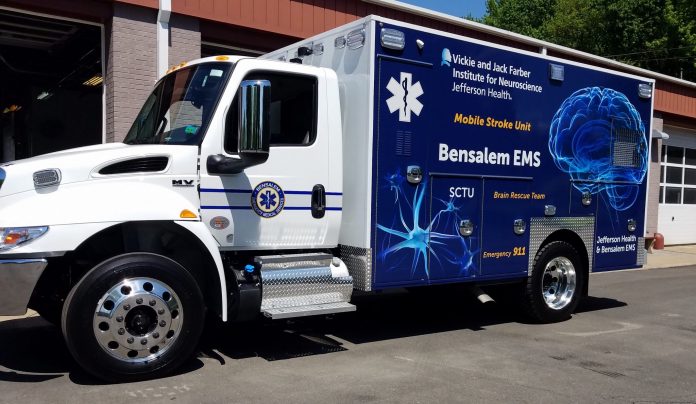In the United States, 750,000 individuals suffer a stroke each year, according to Dr. Robert Rosenwasser, professor and chairman of the Department of Neurological Surgery for Thomas Jefferson University.
While a stroke isn’t always fatal, it can oftentimes lead to paralysis and other complications if not treated quickly enough. Every second is precious, and last year, Rosenwasser helped discover the “secret sauce” to save as many patients as possible – a partnership with Bensalem Township and the Bensalem Rescue Squad.
In August 2019, Jefferson and Bensalem unveiled the state-of-the-art Mobile Stroke Unit, which delivers stroke care to patients before they even enter the emergency room. Rosenwasser and Bensalem Rescue Squad executive director Thomas Topley were special guests on a virtual edition of The Mayor’s Show, hosted by Bensalem Township Mayor Joseph DiGirolamo, to celebrate the anniversary of the life-saver on wheels.
“We’ve served over the last year 210,000 residents and 1 million visitors to the communities in southeastern Bucks County. In the first year, the Mobile Stroke Unit responded to 286 emergency calls, 139 of those patients exhibiting the signs and symptoms of a stroke as identified by the chief and his crew,” said Rosenwasser.

With Rosenwasser on hand through telemedicine, similar to a Zoom call, Bensalem EMS provides immediate CT scans in the Mobile Stroke Unit. For those who qualify, a clot-busting drug is then administered, with an average time of 29 minutes from diagnosis to treatment.
“It’s phenomenal because the American Heart guidelines are saying, if you can do it in 60 to 45 minutes, you’re doing great. But many people fall out of the window because of the time it takes to pick up the patient and transport them to the hospital,” Rosenwasser said. “There’s no doubt that this really is establishing a new standard of care.”
Topley stressed that public education is key when it comes to treating a stroke patient. Magnets outlining signs of a stroke (loss of balance, vision loss, uneven smile, one weak arm and slurred speech) are being distributed to homes.
“When you call 9-1-1, your call is forwarded to the Bucks County dispatching site in Ivyland, Pennsylvania, and the dispatcher searches for keywords. So, if you call, they’ll recognize symptoms and dispatch the call as a possible stroke,” said Topley. “Our curve, from the moment we get to your house to the time we start the CT scan machine, is under 10 minutes. To me, that is truly amazing.”
Rosenwasser echoed Topley’s sentiment, stressing the importance of knowing the signs.
“Thirty-five years ago, people didn’t know the symptoms of a heart attack. Nobody knew arm pain, chest pain, jaw pain, things like that. Through the efforts of public education, everyone knows the signs and symptoms of a heart attack. We’re really on that same journey to educate the public for stroke because they can be treated now.”
A prime example of the MSU’s life-saving power is a 102-year-old woman who recently received the clot-busting medication inside the Mobile Stroke Unit.
“She was two hours and 45 minutes into her stroke. If she had to travel to an ER, she would’ve been beyond three hours and beyond the window where she could receive the medicine. Because this was there, we were able to give her the clot-busting drug within the window, and she walked out of the hospital,” said Rosenwasser. “Every minute that we are unable to treat this, billions and billions of brain cells are dying. After three minutes, brain cells start dying. That’s why time is so critical. The MSU really condenses down the time for what is the best treatment for that patient.”
Health professionals across the county have approached Rosenwasser, asking how the Mobile Stroke Unit is working so well in Bensalem. He said its success wouldn’t be possible without Topley and DiGirolamo.
“I know how to take care of a stroke, but I’m not a first responder. I don’t know the logistics and all that’s involved in the things that the chief does and his crew. It was their expertise,” said Rosenwasser. “It was a marriage made in heaven. The ‘secret sauce’ is partnering with the Bensalem EMS. Clearly, that’s what we’ve done differently than any other unit in the United States. No one’s nearly as successful as we have been. This will not work as well as it has worked without partnering with the local communities, government, local EMS and first responders.”
The Mobile Stroke Unit is changing the acute management of stroke, and Rosenwasser predicts a “whole army” of these ambulances will be requested in the near future. The Bensalem MSU has expanded beyond the township to serve 83 square miles.
“We certainly have a winning team with this one and we’ve already saved lives,” said DiGirolamo. “And there’s hope for me at 102, so I’ll remember that one.”
Samantha Bambino can be reached at [email protected]


